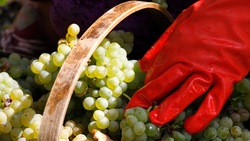Nikkei | 5 Juy 2018
Vineyard seizures highlight French worries about Chinese investments
Vineyard seizures highlight French worries about Chinese investments
by TALLULAH LUTKIN
PARIS -- French authorities have seized 10 wine chateaux owned by Chinese conglomerate Haichang Group as part of an investigation into alleged illegal financial activities.
Judicial police say they have found evidence of money laundering and the use of irregular documents in the acquisition of vineyards. The case comes amid concerns in France about foreign investors, especially from China, taking over large swathes of farmland.
The winery seizures were triggered by investigators' suspicions that fake deeds and the possible identity theft of a French solicitor may have been involved in a 30 million euros ($34.9 million) loan from the French branch of Industrial and Commercial Bank of China (ICBC) and concerns about suspicious operations in offshore companies.
Maxime Delhomme, a lawyer for Haichang, told French news agency AFP, "We have appealed against the ruling, which is only a seizure preventing us from selling and does not indicate guilt."
Haichang owns a total of 24 wine chateaux in the Bordeaux region which it bought for 55 million euros. Investigators have been concerned about the investments since a 2014 news report suggested that Chinese public money had been improperly used in the purchases.
According to the report, Haichang and another company from the northeastern Chinese city of Dalian had been given 268 million yuan ($40.3 million) by local authorities to invest in foreign technology but instead used the funds to purchase French vineyards.
Chinese investors have been buying up French vineyards at a breakneck pace over the last five years. An estimated 160 chateaux are now under Chinese ownership, up from 30 in 2012.
The vast majority of acquisitions have been in the Bordeaux region, which is well-known among Chinese consumers. According to local estate agents, Chinese buyers are also attuned to the beauty of the chateau buildings in the area. Some 3% of Bordeaux's wine-growing region is now owned by approximately 75 Chinese investors.
Chinese investors, including Haichang, have mostly focused on small chateaux priced below 10 million euros. Recently though, some investors have been looking to buy more prestigious vineyards. Last December, Hong Kong businessman Peter Kwok bought a Saint-Emilion grand cru winery for 30 million euros.
A large part of the production from these wineries is destined for export, as Chinese appetites for imported wine show no sign of cooling off. The number of Chinese consumers buying imported wine more than doubled between 2011 and 2016, reaching 48 million people, according to research consultancy company Wine Intelligence. Bordeaux vineyards sold 84 million bottles in China in 2017, 30% of the region's total wine exports.
It is not just the wine sector which is attracting the attention of Chinese investors. In 2016 and 2017, Hongyang Group, a company whose primary business is the manufacture of fuel dispensers, bought 2,600 acres of agricultural fields in central France.
A lack of arable land is pushing Chinese investors to purchase agricultural land across the globe. This trend is a source of concern for the French agricultural sector, which is already struggling to recruit a new generation of farmers.
Local rural land agencies called Safer regulate the sale and purchase of agricultural land, but investors have found loopholes in the system to bypass its scrutiny. "Our goal is to have a right of inspection on all transactions," senior Safer official Emmanuel Hyest told the Nikkei Asian Review. "That doesn't necessarily mean we will intervene every time, but we want there to be complete transparency."
In an address to 100 young farmers at the Elysee Palace in February, President Emmanuel Macron said: "Agricultural land in France is a strategic investment on which our sovereignty depends. We cannot let foreign powers buy hundreds of acres of land without being aware of their purpose." He promised to impose "regulatory barriers" on acquisitions of agricultural land by foreign investors.
A new law regarding agricultural property is in the works and is scheduled to be discussed in parliament early next year. Legislators must try to reconcile demands from farmers' unions to subject agricultural purchases to state control -- as is the case with strategic sectors like defense -- with laws on property rights and free enterprise.
Not everyone in southern France has a hostile view to foreign investors. In the Bordeaux region, inhabitants have come to see the benefits of their Chinese neighbors, who are restoring some historic wine mansions and keeping on local staff to maintain a high-quality standard. What is more, wine exports from Bordeaux are showcasing the region to Chinese tourists who could give the local economy another boost.













